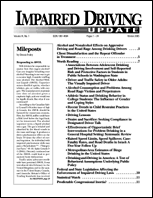Study Suggests That Risky Behavior Is Contagious and Has a Neural Basis
Author: Claire Samuelson.
Source: Volume 21, Number 04, Fall 2017 , pp.84-85(2)

< previous article |next article > |return to table of contents
Abstract:
When compared with drivers over the age of 25, younger drivers tend to engage in more risky driving behaviors that increase the risk of an automobile accident, such as speeding, DWI/DUI, illegal turns, texting, and tailgating. While a number of factors have been found to influence engagement in risky driving behaviors, a new study published by researchers from Caltech and the University of Melbourne suggests that observing the behaviors of others may influence whether or not someone engages in risky behaviors on and off the road. This article reviews the findings of this research published by Shinsuke Suzuki et al., “Behavioral Contagion During Learning About Another Agent’s Risk-Preferences Acts on the Neural Representation of Decision-Risk” published in PNAS 3755-760 (2016).Keywords: Risk preferences among young drivers
Affiliations:
1: UCLA Integrated Substance Abuse Programs.